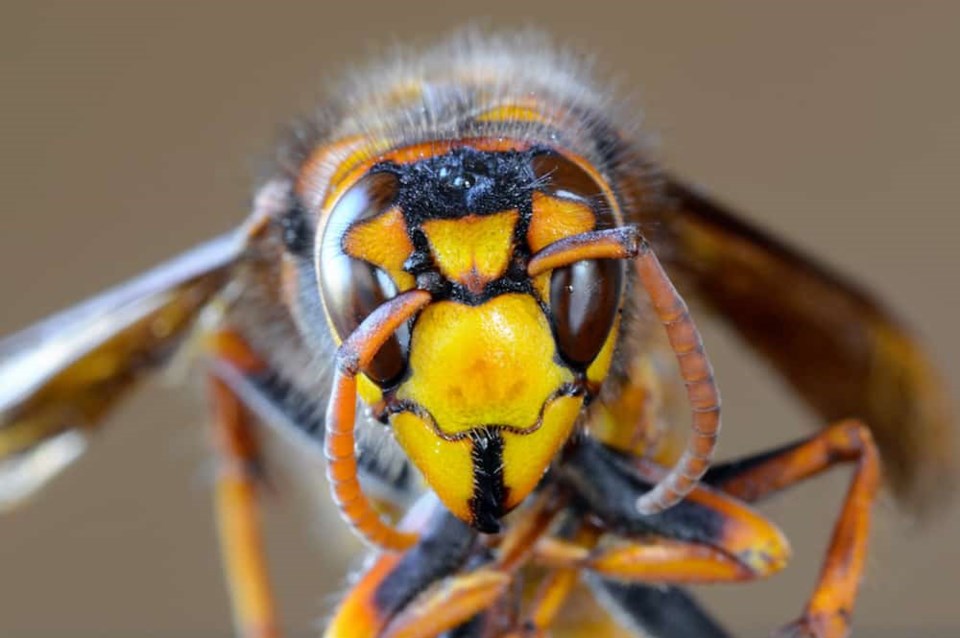B.C. officials will focus on the Fraser Valley in their efforts to track and eradicate Asian giant hornets this year.
Last year, six Asian giant hornets were found in the Fraser Valley in 2020, which is why the Province will target the region.
Provincial Apiculturist Paul van Westendorp says all of the hornets caught in the Fraser Valley last year were found by the public, not through the ministry's traps, which highlights the importance of public outreach.
Also dubbed the murder hornet, the invasive wasps threaten pollinators and have been found in communities along both sides of the Canada-U.S. border and on Vancouver Island.
In an international effort to eradicate it in the Pacific Northwest, British Columbia, the State of Washington and U.S. federal agencies are collaborating on plans to track, trap and eradicate any Asian giant hornets that are found.
But officials are calling on the public to step up.
Reports from the public have been crucial for locating Asian giant hornets. Last year, half of the confirmed reports in Washington state and all of the confirmed reports in British Columbia were from members of the public.
In British Columbia, the 2021 Asian giant hornet surveillance program will include traps in areas where there were previous findings, as well as continued outreach and networking with B.C. beekeepers, local governments and partner agencies in those areas. This work will continue last year’s efforts with comprehensive surveys in Nanaimo and the Cowichan Valley on Vancouver Island, and from White Rock to Aldergrove in the Fraser Valley.
Washington state’s plans are similar to last year’s, including a strong emphasis on public outreach, reporting and trapping in addition to the agency’s trapping. The Washington State Department of Agriculture (WSDA) will continue to use orange juice and rice cooking wine in traps. Citizen scientists will have the option of using either orange juice or a brown sugar-based bait.
WSDA’s trapping will remain focused on areas in Whatcom County where Asian giant hornets were detected in 2019 and 2020. Residents in Whatcom, Skagit, San Juan, Island, Jefferson and Clallam counties are especially encouraged to participate in citizen scientist trapping beginning in July 2021.
The buzz about Asian giant hornets
An invasive species, the Asian Giant Hornet (Vespa mandarinia), is commonly referred to as the 'murder hornet.' Normally found in the forests and low mountains of eastern and southeast Asia, it remains unclear how they arrived in North America. Their moniker — perhaps better suited for a comic book title or rock band name — was coined in Japan.
Despite the presence of more specimens and the discovery of a nest, Westerndorp says it isn't a cause for mass hysteria. While they can be dangerous when their nests are disturbed, they are not actively attacking humans. That said, he emphasizes that you should not disturb their nests--which are typically located on the ground or in crevasses.
Disturbing a nest will put them on the attack. And a sting packs a mighty wallop.
A Vancouver Island man says the sting felt as though hot thumbtacks had been stuck into his leg. Further, he experienced “throbbing muscular aches” in his legs for about 24 hours.
What to do
• If you find a nest, do not disturb it. Leave the area.
• Stings are rare but could occur if the nest is disturbed.
• Because of the larger amount of venom injected, a sting can be very painful and cause localized swelling, redness and itching.
• Treat a sting similar to wasp or bee stings by putting ice or a cold compress on the site to reduce inflammation and spread of venom.
• Do not rub the site because it will spread venom.
• People who are stung multiple times (10 or more) have a higher risk of developing toxic or allergic reactions, lightheadedness or dizziness.
• People who are stung multiple time or who develop symptoms of toxic or allergic reactions are advised to seek medical attention immediately.
• If you think you’ve spotted an Asian giant hornet, call the Invasive Species Council of B.C. at 1-888-933-3722, or via the council’s “Report Invasives” mobile phone app, or online HERE.
- With files from Carla Wilson / The Times Colonist and The Canadian Press.



